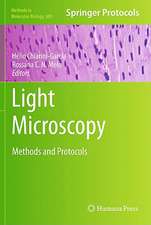Cell Cycle Checkpoint Control Protocols: Methods in Molecular Biology, cartea 241
Editat de Howard B. Liebermanen Limba Engleză Hardback – 14 noi 2003
| Toate formatele și edițiile | Preț | Express |
|---|---|---|
| Paperback (1) | 644.18 lei 6-8 săpt. | |
| Humana Press Inc. – 10 noi 2010 | 644.18 lei 6-8 săpt. | |
| Hardback (1) | 652.31 lei 6-8 săpt. | |
| Humana Press Inc. – 14 noi 2003 | 652.31 lei 6-8 săpt. |
Din seria Methods in Molecular Biology
- 9%
 Preț: 791.59 lei
Preț: 791.59 lei - 23%
 Preț: 598.56 lei
Preț: 598.56 lei - 20%
 Preț: 882.95 lei
Preț: 882.95 lei -
 Preț: 252.04 lei
Preț: 252.04 lei - 5%
 Preț: 802.69 lei
Preț: 802.69 lei - 5%
 Preț: 729.61 lei
Preț: 729.61 lei - 5%
 Preț: 731.43 lei
Preț: 731.43 lei - 5%
 Preț: 741.30 lei
Preț: 741.30 lei - 5%
 Preț: 747.16 lei
Preț: 747.16 lei - 15%
 Preț: 663.45 lei
Preț: 663.45 lei - 18%
 Preț: 1025.34 lei
Preț: 1025.34 lei - 5%
 Preț: 734.57 lei
Preț: 734.57 lei - 18%
 Preț: 914.20 lei
Preț: 914.20 lei - 15%
 Preț: 664.61 lei
Preț: 664.61 lei - 15%
 Preț: 654.12 lei
Preț: 654.12 lei - 18%
 Preț: 1414.74 lei
Preț: 1414.74 lei - 5%
 Preț: 742.60 lei
Preț: 742.60 lei - 20%
 Preț: 821.63 lei
Preț: 821.63 lei - 18%
 Preț: 972.30 lei
Preț: 972.30 lei - 15%
 Preț: 660.49 lei
Preț: 660.49 lei - 5%
 Preț: 738.41 lei
Preț: 738.41 lei - 18%
 Preț: 984.92 lei
Preț: 984.92 lei - 5%
 Preț: 733.29 lei
Preț: 733.29 lei -
 Preț: 392.58 lei
Preț: 392.58 lei - 5%
 Preț: 746.26 lei
Preț: 746.26 lei - 18%
 Preț: 962.66 lei
Preț: 962.66 lei - 23%
 Preț: 860.21 lei
Preț: 860.21 lei - 15%
 Preț: 652.64 lei
Preț: 652.64 lei - 5%
 Preț: 1055.50 lei
Preț: 1055.50 lei - 23%
 Preț: 883.85 lei
Preț: 883.85 lei - 19%
 Preț: 491.88 lei
Preț: 491.88 lei - 5%
 Preț: 1038.84 lei
Preț: 1038.84 lei - 5%
 Preț: 524.15 lei
Preț: 524.15 lei - 18%
 Preț: 2122.34 lei
Preț: 2122.34 lei - 5%
 Preț: 1299.23 lei
Preț: 1299.23 lei - 5%
 Preț: 1339.10 lei
Preț: 1339.10 lei - 18%
 Preț: 1390.26 lei
Preț: 1390.26 lei - 18%
 Preț: 1395.63 lei
Preț: 1395.63 lei - 18%
 Preț: 1129.65 lei
Preț: 1129.65 lei - 18%
 Preț: 1408.26 lei
Preț: 1408.26 lei - 18%
 Preț: 1124.92 lei
Preț: 1124.92 lei - 18%
 Preț: 966.27 lei
Preț: 966.27 lei - 5%
 Preț: 1299.99 lei
Preț: 1299.99 lei - 5%
 Preț: 1108.51 lei
Preț: 1108.51 lei - 5%
 Preț: 983.72 lei
Preț: 983.72 lei - 5%
 Preț: 728.16 lei
Preț: 728.16 lei - 18%
 Preț: 1118.62 lei
Preț: 1118.62 lei - 18%
 Preț: 955.25 lei
Preț: 955.25 lei - 5%
 Preț: 1035.60 lei
Preț: 1035.60 lei - 18%
 Preț: 1400.35 lei
Preț: 1400.35 lei
Preț: 652.31 lei
Preț vechi: 767.42 lei
-15% Nou
Puncte Express: 978
Preț estimativ în valută:
124.82€ • 130.67$ • 103.28£
124.82€ • 130.67$ • 103.28£
Carte tipărită la comandă
Livrare economică 07-21 aprilie
Preluare comenzi: 021 569.72.76
Specificații
ISBN-13: 9781588291158
ISBN-10: 1588291154
Pagini: 392
Ilustrații: XVI, 376 p.
Dimensiuni: 155 x 235 x 30 mm
Greutate: 0.75 kg
Ediția:2004
Editura: Humana Press Inc.
Colecția Humana
Seria Methods in Molecular Biology
Locul publicării:Totowa, NJ, United States
ISBN-10: 1588291154
Pagini: 392
Ilustrații: XVI, 376 p.
Dimensiuni: 155 x 235 x 30 mm
Greutate: 0.75 kg
Ediția:2004
Editura: Humana Press Inc.
Colecția Humana
Seria Methods in Molecular Biology
Locul publicării:Totowa, NJ, United States
Public țintă
ResearchCuprins
Induction and Detection of Changes in cell Cycle Progression.- Methods to Induce Cell Cycle Checkpoints.- Methods for Synchronizing Mammalian Cells.- Enrichment of Cells in Different Phases of the Cell Cycle by Centrifugal Elutriation.- Analysis of the Mammalian Cell Cycle by Flow Cytometry.- Methods for Detecting Cells in S Phase.- Yeast Cell Synchronization.- Analysis of the Budding Yeast Saccharomyces cerevisiae Cell Cycle by Morphological Criteria and Flow Cytometry.- Analysis of the Fission Yeast Schizosaccharomyces pombe Cell Cycle.- Analysis of Genes Involved in Checkpoint Control.- Strategies to Isolate Evolutionarily Conserved Cell Cycle Regulatory Genes.- Microarray Approaches for Analysis of Cell Cycle Regulatory Genes.- Using the Yeast Genome-Wide Gene-Deletion Collection for Systematic Genetic Screens.- Gene Targeting in Cultured Human Cells.- Use of In Vivo Gap Repair for Isolation of Mutant Alleles of a Checkpoint Gene.- In Vitro Mutagenesis to Define Functional Domains.- Use of Gene Overexpression to Assess Function in Cell Cycle Control.- Histone Acetylation/Deacetylation As a Regulator of Cell Cycle Gene Expression.- Analysis of Proteins Involved in Checkpoint Control.- Cataloging Proteins in Cell Cycle Control.- Multidimensional Proteomic Analysis of Proteolytic Pathways Involved in Cell Cycle Control.- Purification and Identification of Protein Complexes That Control the Cell Cycle.- Xenopus Cell-Free Extracts to Study DNA Damage Checkpoints.- Protein-Protein Interactions.- Detection of Kinase and Phosphatase Activities.- Monitoring Changes in the Subcellular Location of Proteins in S. cerevisiae.- Chromosomes and the Cell Cycle.- Chromosomal Changes and Cell Cycle Checkpoints in Mammalian Cells.- Detecting the Influence of Cell Cycle Regulatory Proteins on Human Telomeres.- Monitoring Spindle Assembly and Disassembly in Yeast by Indirect Immunofluorescence.
Recenzii
"...includes step-by-step instructions written by an investigator who performs it frequently, an introduction explaining the principle behind the method, equipment and reagent lists, and tips on troubleshooting and avoiding known pitfalls." - Tumori
Textul de pe ultima copertă
In recent years, cell cycle checkpoints, cellular mechanisms that control the cell cycle and ensure genomic stability, have emerged as significant factors in carcinogenesis and in cancer cells. In Cell Cycle Checkpoint Control Protocols, leading investigators present their best methodologies to probe the mechanisms underlying cell cycle regulation and checkpoint control. Using mammalian, yeast, and frog systems, these experts describe readily reproducible methods to induce cell cycle checkpoints, detect changes in cell cycle progression, identify and analyze genes and proteins that regulate the process, and characterize chromosomal status as a function of cell cycle phase and progression. Each fully tested technique includes step-by-step instructions written by an investigator who performs it frequently, an introduction explaining the principle behind the method, equipment and reagent lists, and tips on troubleshooting and avoiding known pitfalls. Taken as a whole, the collection describes the major methodologies used by researchers in the field.
Cutting-edge and highly practical, Cell Cycle Checkpoint Control Protocols provides an extensive array of detailed protocols by which both experienced and novice investigators may successfully illuminate questions concerning cell cycle control.
Cutting-edge and highly practical, Cell Cycle Checkpoint Control Protocols provides an extensive array of detailed protocols by which both experienced and novice investigators may successfully illuminate questions concerning cell cycle control.
Caracteristici
Includes supplementary material: sn.pub/extras
















